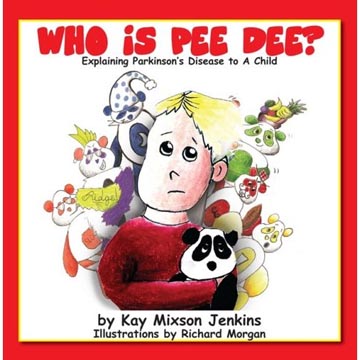Regular exposure to agricultural pesticides might increase the risk of Parkinson’s disease (PD), according to a study published in Archives of Neurology. More exposure to pesticides means a higher chance of the neurological illness, research reports.

“While the causes of PD are still not clear,†says Kay Mixson Jenkins, author of the new children’s book Who Is Pee Dee?, “hardcore chemicals used for treating crops can’t be that good for people in any event.â€
Ms. Jenkins was diagnosed with Parkinson’s when she was just thirty-four. She decided to write her book to help her children understand this devastating disease. The story follows a young boy named Colt as he tries to deal with his mother’s chronic illness.
Based on National Parkinson Foundation estimations, almost 1.5 million Americans currently have PD. It’s the second-largest neurological disorder (after Alzheimer’s) in the United States.
The illness typically develops later in life and often impairs motor skills, speech and other functions.
Many scientists and researchers believe that environmental factors can be linked to the illness:
• Aberdeen University Medical School found that people exposed to high levels of pesticides were forty-one percent more likely to develop the condition compared to people who had never been exposed; those exposed to low levels were thirteen percent more likely.
• Environmental Health News reports that the rates of Parkinson’s disease appear higher among farmers and rural residents.
• A Danish cohort study found an increased risk of Parkinson’s disease in agricultural workers.
• Emory University reported growing evidence suggesting that exposure to pesticides increases the risk of Parkinson’s disease.
• Researchers from UT Southwestern Medical Center found that people with Parkinson’s disease have significantly higher blood levels of a particular pesticide than healthy people.
“I hope studies and facts like these will help bring the government’s attention to the environmental problems our society faces today,†says Ms. Jenkins. “If we can simply protect our environment and be greener, who knows? Maybe the number of Parkinson’s cases will go down.â€
In addition to writing Who Is Pee Dee?, Ms. Jenkins is a leader in a nationwide effort to raise awareness about PD. As the founder of Parkinson’s in the Park, an affiliated chapter of the National Parkinson Foundation, Ms. Jenkins has created an outreach program that encourages families and friends to participate in the treatment of PD patients.
Kay Mixson Jenkins is also the Georgia state co-coordinator for the Parkinson’s Action Network, leads the Effingham County Parkinson’s support group and was selected as a Parkinson’s patient advocate for UCB, Inc.
Who Is Pee Dee? Explaining Parkinson’s Disease to a Child by Kay Mixson Jenkins is available on Amazon.com.
Via EPR Network
More Healthcare press releases



